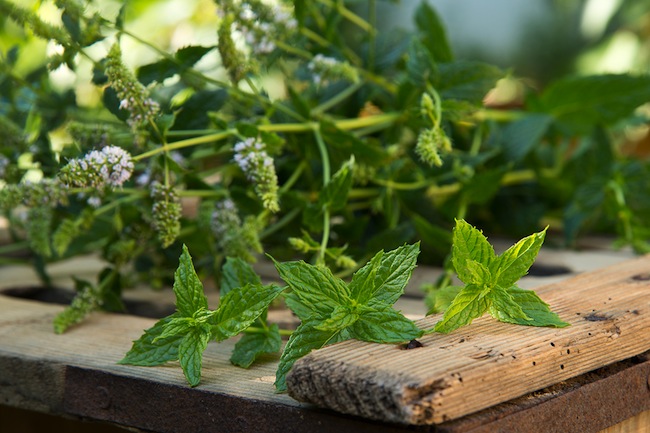- Make It Yourself Lavender Heart-Shaped Bath Bombs!
- 20 Things You Never Knew About “Down There”
- 12 Best Foods For Those Suffering From Arthritis Pain
- 12 Personal Hygiene Mistakes Almost Everyone Makes (Mom Never Told You About #4!)
- 15 Medicinal Plants And Herbs From The Cherokee People
- 12 Mind-Blowing Benefits Of Drinking Coconut Water During Pregnancy
- 12 Outstanding Winter Foods That Won’t Fatten You Up Like A Christmas Turkey
Why You Need More Peppermint In Your Life

Photo credit: bigstock.com
Most people are aware that herbal medicine is among the oldest forms of healing. In the days before clinical research and modern hospitals, people relied on what nature had to offer to remedy disease and ward off illness. One herb that has a long tradition of medicinal use is peppermint, though that is probably not what most people in the Western world know it for. Nowadays, most people think of chewing gum, mouthwash, or some other such product when they hear the word “peppermint.” But there has been a recent resurgence of interest in traditional herbal remedies, and many people are beginning to appreciate the healing properties of this incredible herb. In this helpful guide, you’ll get a full overview of the benefits of peppermint, and learn why you should be using more of it.
“Peppermint” is a naturally occurring hybrid of two other forms of this plant, water mint and spearmint. The use of peppermint in traditional folk medicines is a practice that goes back thousands of years. Historical research and records show the use of peppermint for healing purposes in Ancient Egypt, Greece, Rome, China, Japan, and more.
Peppermint can be used for healing purposes both in its whole leaf form and as an oil, which is more common. Peppermint oil is made via the process of steam distilling the essential oil out from the leaves. The active ingredients to which peppermint’s healing properties can be attributed are menthol and menthone.
One of the earliest uses for peppermint was easing stomach cramps and bowel problems. Teas prepared with peppermint leaves can soothe stomach pain and discomfort, alleviate cramps and diarrhea, and reduce nausea. Modern scientific studies have confirmed the validity of these applications.
One example is irritable bowel syndrome, or IBS. A study found that peppermint oil capsules were able to significantly reduce pain in 75 percent of IBS patients (all children) over the course of a two-week experiment.
Peppermint can also help relieve indigestion and bloating, and can serve as a safe and natural alternative to mass-produced medicines. Mix one drop of peppermint oil with water or try drinking a cup of peppermint tea if you are experiencing symptoms.
Continue to Page 2

Photo credit: bigstock.com
Peppermint also combats other gastrointestinal-related problems like functional dyspepsia. A study published in the Ailment Pharmacology and Therapy medical journal revealed that a combination of peppermint and caraway oil treatment significantly improved symptoms in 67 percent of patients.
Colon conditions like colonic spasms and infantile colic can also be improved with peppermint oil. A 2003 study found that peppermint oil mixed with barium made enema treatments for colonic spasms more effective. Obviously, these are both serious conditions, so seek professional guidance from a doctor or pediatrician before attempting any treatment.
In addition to its many stomach and intestinal benefits, peppermint also helps with respiratory conditions. This is usually done by breathing in peppermint oil fumes from a diffuser or boiling water (obviously be careful not to scald yourself if you pursue the latter option).
One study conducted in 2009 found that inhaling peppermint oil fumes could significantly improve the symptoms and inflammation associated with tuberculosis. Breathing in diffused peppermint oil can also bring relief to people suffering from the common cold, seasonal allergies and congested sinuses.
There are also its pain-relieving qualities. If you have ever used a rub for sore muscles, you’ve probably noticed it has a very powerful, mint-like scent that immediately clears out your sinuses. This is because of the active ingredient, menthol. It turns out that menthol is very helpful for alleviating soreness and pain caused by inflammation in the muscles or joints. A study found that topical application of peppermint oil was effective for reducing pain caused by myofascial pain syndrome and fibromyalgia, producing results that were comparable to commercial products like Icy Hot and other natural products like eucalyptus oil.
READ ALSO: Chamomile Tea Lowers The Risk Of One Very Big Cancer
Peppermint and peppermint oil have many natural medicinal purposes, and we’ve only begun to scratch the surface here, but this guide offers insight into some of the most beneficial applications of this amazing herb. It has stood the test of time, and modern science backs it up.
References:
































